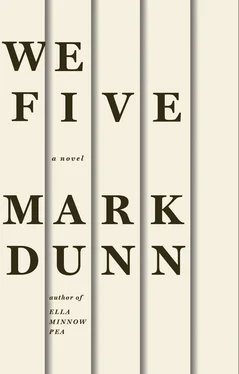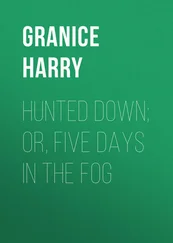Ruth went to the bed and took both of Maggie’s hands into her own. “It has yet to be decided just what we shall do with Lyle, but I would like to say this withal: that your willingness to help her brother will be a great boon and comfort to our sister Jane.”
Miss Mobry shook her head. “Maggie Barton, I can scarcely believe it. That you should be willing to put your future liberty, perhaps even your very life, in jeopardy to assist a man who has had no match in all of Lancashire for ignominy of reputation! Lyle Higgins , who now enters himself into the chronicles of male moral malignancy through this culminant act of degeneracy: the premeditated, gelid-blooded slaughter of another human being — this is the man you wish to help? I must sit down. My legs are weak.”
Lucile Mobry dropped herself to the bed, where she sate in awkward repose, her head moving slowly back and forth like something mechanical that was retarding itself to a state of total motionlessness.
Clara Barton was shaking her head as well. “Maggie, you have made especial effort not to forgive Michael Osborne for defects of character, which you were always eager to catalogue with the most complacent glee. You refused to absolve him of his own act of violence, to pardon him for any of those failings which led him to it, refused to help me balm the pain that put him in such a bad way. And now you wake from your trance and are ready and willing to aid and abet and secrete this other man who has killed for no reason but the pure lust to kill!”
Maggie rose up in anger. “That is a foul and filthy falsehood! What Higgins did he did from love for his sister!”
Maggie’s sudden outburst drew an equally sharp rejoinder from Clara, who could not hide the pain which brittled her words: “ And Michael Osborne did what he did from love for his daughter! ”
The room rang with the echo of Clara Barton’s eruption. Maggie, her hands now free of Ruth’s clasp, sought her mother’s fingers to intertwine.
“Don’t you see?” wept Clara. “How can you not see?”
And Maggie responded, her eyes brimming with fresh tears, “Yet I do, Mamma. Now I do.”
She bowed her head. When a moment later it uprose, Maggie fastened her filmy gaze upon the broken lineaments of her mother’s anguish-darkened countenance. “Mamma, take Michael Osborne to Anglesey — to Uncle Whitman’s cottage by the sea. Jane and I will do likewise with Lyle. We cannot go together, for it isn’t safe that way, but we will all be there in three days’ time. I know not what the future holds for any of us, but at least we shall face it with a commonality of strength and resolve.”
“And what of Molly?” asked Clara.
“It remains to be seen,” said Ruth, “if Molly Osborne can find it within her heart to forgive her father.”
Now Maggie looked at Lucile Mobry, who seemed a fading shadow in the room of staunch women. She said to her, “Every man is drowning, Miss Mobry — slowly, quickly, in one way or another; you are right. But it is our charge as women to throw out the lifeline. Some men will refuse our help. Others will try to pull us down with them. Still others will blame us for their foundering. But still we must take up the burden of their recovery and ultimate redemption. It is one of the reasons God has put us upon this spinning coil. This I now believe.” And then, as she betook herself from the bed, she said, “Mamma, my only regret in rising from this bed is losing the chance to have you attend me for a change. But I do fancy that from now on we will make it our business to take care of one another in equal measure. Come, Ruth. We haven’t much time, and we must first see to your face.”
The two sisters started from the room. Miss Mobry called after her niece, “You never told me why this terrible thing was done to your lovely cheek.”
Ruth stopped and turned. “No, I never did. Nor will I describe what I did to his face in return. I will say only this: he looks far worse than I do.”
Herbert Mobry found the girl where he was told she would be, standing where the High Road communicated with the Factory Road, which led to the Tulleford Cotton Mill. On any given day this corner was traversed by well nigh every resident of the town for one purpose or another.
It was Jemma Spalding’s purpose to stand upon a wooden poultry crate and broadcast in a raised and highly spirited voice that which she was convinced would in a very short time befall the planet: its sudden demise.
Or, to put it in more dramatic terms: The Veritable End of the World.
Jemma’s voice rang loud and clear to Mobry’s ears as he approached. She sang out, “The end is nigh! Make right! Make right with the Lord!”
As Jemma came into view, someone else came into view as well. It was Molly Osborne, who stood next to her cousin, tugging at her sleeve and saying in quietly frantic tones, “You must desist, Jemma. What you are saying is absolute madness. And it is frightening the children.”
Herbert Mobry touched Molly’s arm. She drew back with a start but then half-smiled to see that reinforcements — of a sort — had arrived. “Mr. Mobry,” she said, relaxing a bit in his presence, “I cannot do this alone. Look at her. She will not suspend. She will be arrested for disturbing the peace and inciting fear amongst the townspeople.”
Mobry swept his hand to take in the growing number who were gathering, as men and women frequently gather to lend eyes and ears to entertaining street-corner purveyors of spurious elixirs. “But who amongst our halfway intelligent fellow citizens should ever purchase such nonsense as this?”
Mr. Mobry’s question was answered by Jemma herself: “It isn’t nonsense, Mr. Mobry. Every word the gipsy said to me will come true. I know that now. For Madame Louisa has come to me in a dream.”
“And what did she say in this dream?”
Replied Jemma, her words delivered with adamant certitude, “That she now knows the very thing the cards have been predicting for over a fortnight. They tell of the end of the world — perhaps within a matter of days, perhaps within a matter of hours. This is what Madame Louisa says.”
Though Molly’s eyes were narrowed upon her cousin, her own words were directed to the former minister, their character cold and biting. “By all evidence, Madame Louisa no longer speaks to Jemma in person because she no longer resides in the town of Tulleford. Perhaps that venerable gipsy has hitched herself to a shooting star so as to remove herself from this doomed planet entirely. Pardon me for interrupting, Jemma. Please go on.”
“I will do it, even though your tone, Molly, is cheeky and irreverent. In the dream, Mr. Mobry, Madame Louisa comes to me and says she has read the cards one last time and they have revealed that the instrument of our planet’s finish will be a great explosion — the explosion of our very sun.”
“I see.” Mobry shook his head gravely, not from subscription to the young woman’s unsettling prognostication, but from the sad verity of her crazed and wild-eyed state. Mobry had other questions he was assembling in his head to ask, and to ask quickly, before a policeman should arrive to take Jemma away — among them, one that struck at the very heart of his religious faith: How is one to believe a woman who says she knows when the world will end, when it was none other than Jesus Christ himself who said in the holy scriptures, “ But of that day and hour knoweth no man, no, not the angels of heaven, but my Father only ”?
But Mobry could not get out his question before Mrs. Colthurst, pushing herself through the congregating crowd in the company of a man roughly her own age, drew Jemma’s eye and her immediate attention. “I have…returned,” Mrs. Colthurst expelled, and then took a moment to catch her breath.
Читать дальше












